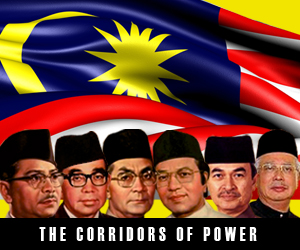The Sedition Act, therefore, is a ‘blank cheque’. Sedition can mean whatever I say it means. And it becomes sedition if it is my opinion that what you say can upset someone and probably threaten the peace and stability of the country even though that cannot be proven.
THE CORRIDORS OF POWER
Raja Petra Kamarudin
Lembah Pantai Member of Parliament Nurul Izzah Anwar was today arrested for a violation under the Sedition Act.
“The police investigation is illegal, unconstitutional and a serious interference with the rights and privileges of Parliament,” said Padang Serai Member of Parliament N. Surendran, who is also a lawyer and a PKR leader.
Article 63(2) of the Federal Constitution confers immunity from any proceedings in court for anything said by a Member of Parliament in Parliament (the Dewan Rakyat).
Subsequent to the 13th May 1969 riots, the Constitution was amended to include a new Article, Article 63(4), which provides an exception to that immunity under 63(2) for words uttered by MPs that fall under the Sedition Act 1948.
“But this exception under 63(4) is limited,” said Surendran. “Action can only be taken against MPs for words uttered which fall under section 3(1)(f) of the Sedition Act 1948 — i.e. on citizenship, the position of Rulers, national language or special position of Malays and the Orang Asal.”
I have, in fact, written about the matter of Malaysia’s Federal Constitution a number of times in the past but I suppose this type of subject is too boring for most people. It is, after all, a very ‘technical’ subject. Well, maybe now some of you will find it more relevant.
What I said in the past is that Malaysia’s Constitution is ambiguous. While it guarantees certain things, such as our rights, in subsequent Articles this right is taken away again.
For example, Malaysians have the right of assembly, association, etc. However, if the powers-that-be thinks that the planned assembly may be a threat to law and order then this right can be taken away. And if you associate with the Communist Party of Malaya or with the Shia movement then you can get arrested because your right of association is limited to ‘approved’ bodies only and only if it does not threaten the security, peace and stability of the country.
You have a right to practice your religion but then, according to the Federal Constitution, religion comes under the state and subject to state laws. So the state can take action against you if the state religious authorities say you have violated state laws concerning religion.
In short, as I always say, the Federal Constitution of Malaysia guarantees you freedom of choice, association, speech, assembly, etc., but does not guarantee you freedom after you have done all that. You have freedom of speech but you do not have freedom after speech.
Take the Sedition Act that Surendran is talking about. The crime of sedition is based on what I consider as sedition. It is my opinion. If I think that what you say would probably upset someone then I can consider that as sedition even if no one really does get upset. It is based on the probability that someone could get upset.
For example, you might say that the Prime Minister is a crook. Then the whole country led by Tun Dr Mahathir Mohamad claps and cheers and agrees with you. Syed Ali Al-Habshee, the division head of Umno Cheras, however, gets upset with what you said. And because he is upset the powers-that-be is of the opinion that others may get upset as well although no one other than Syed Ali appears upset. Hence this can be considered as sedition and action can be taken against you.
The Sedition Act, therefore, is a ‘blank cheque’. Sedition can mean whatever I say it means. And it becomes sedition if it is my opinion that what you say can upset someone and probably threaten the peace and stability of the country even though that cannot be proven.
Now, while religion comes under the state, the Rulers are head of religion in their respective states. Hence if, say, HRH the Sultan of Kelantan wants Hudud implemented in his state, then the state government has to pass that Bill in the Kelantan State Assembly, whoever that state government may be (unless the state government wants to go against the Sultan and trigger a Constitutional Crisis).
In the case of Kelantan, it is a Pakatan Rakyat state government led by PAS — just like in Penang it is a Pakatan Rakyat state government led by DAP and in Selangor a Pakatan Rakyat state government led by PKR (as the Selangor Menteri Besar crisis has proven).
Hence the Pakatan Rakyat Kelantan state government would have no choice but to proceed with the Hudud plan on Wednesday and if DAP and PKR, the other two partners in Pakatan Rakyat, do not agree with this then they would have to bring this matter up with HRH the Sultan rather than threaten PAS, like what they are doing now.
The same goes for Selangor where HRH the Sultan of Selangor is head of religion. The Selangor state law barring non-Muslims from using Allah and about two dozen other words was passed into law during the tenure of HRH’s father as Sultan. The fact that the present Sultan has not asked for this law to be abrogated means HRH wants that law to remain.
Hence, if Pakatan Rakyat wants to abrogate this law, the Menteri Besar will have to bring this matter up with the Sultan. But Pakatan Rakyat has not done this. So that means Pakatan Rakyat has no intention of abrogating that law. So, should the voters be angry with the Muslims and with the state religious authorities or with Pakatan Rakyat for agreeing that this law should remain?




No comments:
Post a Comment
Note: Only a member of this blog may post a comment.